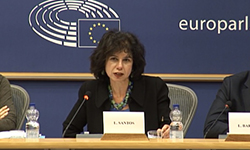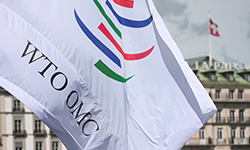BusinessEurope Headlines No. 2018-37
Meeting the Chinese Ambassador to the EU ahead of the 2nd EU-China CEO and Former Senior Officials Dialogue

On 16 November, BusinessEurope Director General Markus J. Beyrer met the Chinese Ambassador to the EU H.E. Zhang Ming to discuss a number of bilateral and global trade issues. The Ambassador informed that the bilateral trade relationship is developing in a positive direction, with investment negotiations moving forward and an agreement on Geographic Indications likely to be concluded by December. Beyrer highlighted that European business still faces a number of obstacles within the Chinese market and that BusinessEurope looks forward to speeding up the investment negotiations, which have been ongoing since 2013. The meeting took place in the context of the 2nd EU-China CEO and Former Senior Officials Dialogue, co-organised and hosted by BusinessEurope, which will take place on 29 and 30 November in Brussels.
Contact: Maurice Fermont
Our comment
The GDPR: A European super power?
By Patrick Grant, Adviser for digital economy
 It’s been six months since the winds changed and the General Data Protection Regulation (GDPR) ushered in a new age for privacy law in Europe. But Europe is no stranger to privacy law. The previous directive was implemented in Member States offering citizens protection and rights over their personal data. But application took place in a patchwork manner due to the mechanism used. As businesses operate across borders this was inefficient. Particularly those companies wishing to scale up and offer services across Europe. A major objective of the GDPR, as a Regulation, was to alleviate businesses’ concerns of the fragmented approach to privacy law that Europe had taken. So, where are we?
It’s been six months since the winds changed and the General Data Protection Regulation (GDPR) ushered in a new age for privacy law in Europe. But Europe is no stranger to privacy law. The previous directive was implemented in Member States offering citizens protection and rights over their personal data. But application took place in a patchwork manner due to the mechanism used. As businesses operate across borders this was inefficient. Particularly those companies wishing to scale up and offer services across Europe. A major objective of the GDPR, as a Regulation, was to alleviate businesses’ concerns of the fragmented approach to privacy law that Europe had taken. So, where are we?
With businesses slowly learning how to apply the GDPR and investing in compliance with all of its implications, it is clear that it will be some time before Europe achieves all of its objectives. Businesses are not only concerned with the open clauses yet to be fully determined in many Member States, but are monitoring how national Data Protection Authorities (DPAs) will cooperate in order to make the “one stop shop” a reality. If Europe is serious about this change, national governments need to fund DPAs appropriately in order to answer, educate and direct businesses who want to comply with the law and offer its benefits to customers.
I was in Tokyo, Japan on Tuesday 20 November to share Europe’s early experiences with the GDPR and what to look out for in the future. Government officials, regulators and industry were naturally interested to hear this as the GDPR has extra-territorial scope. No matter where your business is based if you offer goods and services to European citizens and process their personal data as a result, you have to apply the GDPR. It is clear that a sense of panic surrounds international businesses in relation to GDPR enforcement due to its high penalties. But they need not worry. European authorities are taking a wait and see approach even in Europe itself. Meaning, for at least the first year of application, penalties will only be placed on those businesses that are blatantly flagrant in breaking the rules. Those acting in good faith and attempting to learn will only be met with cooperation. BusinessEurope is encouraging this approach across all Member States.
Internationally, regions are waking up to the global change of consumers towards privacy. Citizens want greater access, control and protection over their data. The USA, India and Japan are all noticing and either consulting or preparing to implement new laws. The GDPR could be the golden international standard to influence this and set Europe in prime position to competitively trade across the world. As services are offered ever more so with goods, data flows will only become more important in global trade.
The future looks bright for EU-Japan relations, the adequacy decision, a mechanism to ensure equivalence of each other’s privacy rules to enable personal data to flow freely and thus be easily processed in either region, is likely to be ratified by the end of this year. As Europe gets its own backyard in order in relation to personal and non-personal data flows our ambitions should now look outwards. Japan is an example of what can be achieved with other crucial economies. Not only will this answer business goals and the elevated state of consumer desires over their data, but strategically, it is vital for Europe itself to influence the global digital rules-based economy. If we do not cooperate with other likeminded regions, others will.
Contact: Patrick Grant
How to ensure an effective EU Trade policy
 On 19 November, the European Parliament Committee on International Trade held its third Trade Policy Day focussing on the implementation of the European Commission`s Trade for All strategy which was adopted in October 2015. “We need to see a shift of focus from the negotiation of trade agreements to the implementation of those that are already in force,” said Luisa Santos, Director for International Relations, during the high-level panel with seven speakers including European Commissioner for Trade Cecilia Malmström. “We must simplify procedures to allow SMEs to benefit from the preferences established by the agreements, and to ensure that trade policy remains pragmatic and not overloaded, so that it can work as an effective tool to spread the EU’s high standards globally”, Santos added.
On 19 November, the European Parliament Committee on International Trade held its third Trade Policy Day focussing on the implementation of the European Commission`s Trade for All strategy which was adopted in October 2015. “We need to see a shift of focus from the negotiation of trade agreements to the implementation of those that are already in force,” said Luisa Santos, Director for International Relations, during the high-level panel with seven speakers including European Commissioner for Trade Cecilia Malmström. “We must simplify procedures to allow SMEs to benefit from the preferences established by the agreements, and to ensure that trade policy remains pragmatic and not overloaded, so that it can work as an effective tool to spread the EU’s high standards globally”, Santos added.
Contact: Eleonora Catella
BusinessEurope’s position paper on Sustainable Finance proposal
 “European industry is at the core of the environmental and energy transformation. Access to finance for investments will be key to make it successful. The European business community is therefore supporting the objective of the Sustainable Finance Action Plan to further mobilise investments in the EU in view of achieving sustainable growth, job creation and prosperity,” is stated in the recently published BusinessEurope position paper on Sustainable Finance EU Action Plan. “We support the idea of creating a level playing field for so-called “green” financial products and to provide greater clarity to the markets through a more coordinated approach. A contribution to these goals could be a well-designed taxonomy to gradually create a unified classification system on what can be considered an environmentally sustainable economic activity. This taxonomy could help to establish a common language for Sustainable Finance,” the position paper says. However, the proposals could have far-reaching impact on the European industry. Therefore, the position paper flags up some crucial points to be carefully addressed and some questions that have to be clarified before proposals are progressed in order to set up a balanced and applicable taxonomy and to avoid unintended negative impact on the competitiveness of European industry.
“European industry is at the core of the environmental and energy transformation. Access to finance for investments will be key to make it successful. The European business community is therefore supporting the objective of the Sustainable Finance Action Plan to further mobilise investments in the EU in view of achieving sustainable growth, job creation and prosperity,” is stated in the recently published BusinessEurope position paper on Sustainable Finance EU Action Plan. “We support the idea of creating a level playing field for so-called “green” financial products and to provide greater clarity to the markets through a more coordinated approach. A contribution to these goals could be a well-designed taxonomy to gradually create a unified classification system on what can be considered an environmentally sustainable economic activity. This taxonomy could help to establish a common language for Sustainable Finance,” the position paper says. However, the proposals could have far-reaching impact on the European industry. Therefore, the position paper flags up some crucial points to be carefully addressed and some questions that have to be clarified before proposals are progressed in order to set up a balanced and applicable taxonomy and to avoid unintended negative impact on the competitiveness of European industry.
![]() Contact: Asdin El Habassi
Contact: Asdin El Habassi
WTO: companies need stability and modern rules to trade and invest
 “The World Trade Organisation (WTO) plays a crucial role in world trade, ensuring rules are respected and implemented fairly. This is critical to create a stable and predictable environment for companies to trade and invest,” said Luisa Santos, Director for International Relations, at the European Economic and Social Committee hearing on “Reforming the WTO to adapt to developments in world trade”. The current multilateral trading system has shortcomings and we need to address them by reforming the WTO in key areas including monitoring, dispute settlement, negotiation and new rules. “We need to agree on ways of making the negotiation role of the WTO more effective, developing new rules in key areas like e-commerce or subsidies and competition, improving the notification system and solving the current problems with the dispute settlement,” Santos said. Stakeholders and business in particular can better support the WTO through increased and more structured cooperation. In this context, the Public Forum and the Trade Dialogues are good initiatives to ensure the WTO remains up-to-speed with the trade and investment reality.
“The World Trade Organisation (WTO) plays a crucial role in world trade, ensuring rules are respected and implemented fairly. This is critical to create a stable and predictable environment for companies to trade and invest,” said Luisa Santos, Director for International Relations, at the European Economic and Social Committee hearing on “Reforming the WTO to adapt to developments in world trade”. The current multilateral trading system has shortcomings and we need to address them by reforming the WTO in key areas including monitoring, dispute settlement, negotiation and new rules. “We need to agree on ways of making the negotiation role of the WTO more effective, developing new rules in key areas like e-commerce or subsidies and competition, improving the notification system and solving the current problems with the dispute settlement,” Santos said. Stakeholders and business in particular can better support the WTO through increased and more structured cooperation. In this context, the Public Forum and the Trade Dialogues are good initiatives to ensure the WTO remains up-to-speed with the trade and investment reality.
Contact: Sofia Bournou
Horizon Europe: Business calls ambassadors to untap potentials of partnerships and missions
 Ahead of the Council’s Permanent Representatives Committee (Coreper) discussions on 21 November, BusinessEurope has sent a letter to EU Member States’ Ambassadors urging them to not cap the budget allocated to the European partnerships nor narrow the scope of the mission areas. Limiting these two instruments would be detrimental for developing innovative solutions and make new entities be unable to participate in the Horizon Europe programme. Partnerships and missions shall be attractive to companies if Europe wants to overcome its innovation deficit.
Ahead of the Council’s Permanent Representatives Committee (Coreper) discussions on 21 November, BusinessEurope has sent a letter to EU Member States’ Ambassadors urging them to not cap the budget allocated to the European partnerships nor narrow the scope of the mission areas. Limiting these two instruments would be detrimental for developing innovative solutions and make new entities be unable to participate in the Horizon Europe programme. Partnerships and missions shall be attractive to companies if Europe wants to overcome its innovation deficit.
![]() Contact: Carolina Vigo
Contact: Carolina Vigo
Calendar
- 25 November: European Council meeting to finalise the Brexit deal
- 27 November: European Trade Policy Day 2018
- 29-30 November: Competitiveness Council
- 2-14 December: Katowice Climate Change Conference COP 24
- 4 December: Better Regulation: make it happen, BusinessEurope event
Reminder: please take a look at our revised privacy policy